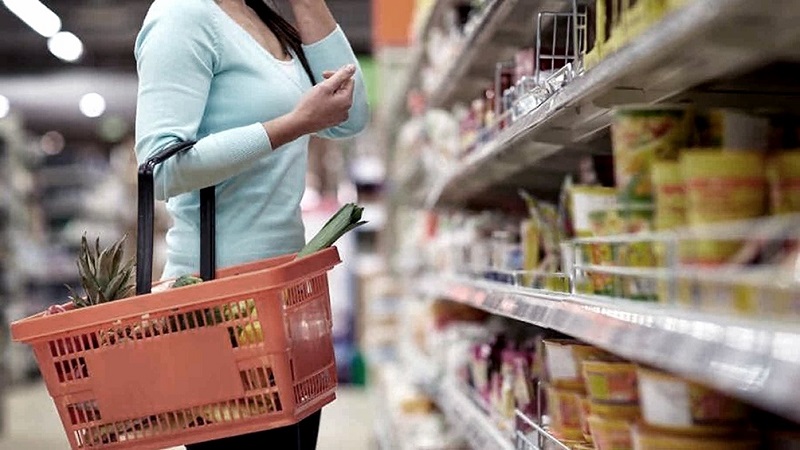
While Alberto Fernandez states that it is a “self-constructed” problem, inflation accelerated again in the first month of 2023 and the consumer’s price index prepared by the National Institute of Statistics and Censuses (Indec) climbed up to the 6% monthly. In this way, the interannual index (of the last 12 months) accumulates 98.8%.
But the costs of the rise in prices, framed in the inflationary plan of the agreement with the IMF, fall on the working class, while real wages fell for the fifth consecutive year. In this framework, it is urgentemergency increase in salary, retirement and social programs to recover what was lostand attack the real causes of inflation.
#DatoINDEC
Consumer prices (#IPC) rose 6% in January 2023 compared to December and 98.8% year-on-year https://t.co/s2yeuD9P77 pic.twitter.com/D2iA2fKAlM— INDEC Argentina (@INDECArgentina) February 14, 2023
He 2022 had closed with a price increase of 94.8% per yearthe highest level in 32 years, since 1991. And last December the indicator had already given above 5%, contradicting the prospects for Sergio Massa to slow down prices.
In January of this year, prices jumped again, largely affected by a jump in meat values that shot up 20%. This Monday Massa announced a Fair Meat Prices program, a new patch that helps that it fails to contain inflationary inertia.
According to the report published this Tuesday by INDEC, “the division with the highest increase in the month was Recreation and culture (9.0%)mainly due to the incidence of the increase in tourism services as a result of the holiday season, and the cable television service”. “The divisions continued in importance in terms of higher monthly increases Housing, water, electricity and other fuels (8.0%)driven in large part by the hike in utility ratesy Communication (8.0%)due to increases in telephone and internet services”.
Also, “The increase in Food and non-alcoholic beverages (6.8%) It was what had the most impact in all regions. Within the division, the rise in the seasonal prices of Fruits and Vegetables, tubers and legumes stood out. In turn, although with less rise than the previous ones, The incidence of Bread and cereals and Meat and derivatives stood out“, detailed the INDEC.
Las price prospects for 2023 are not very optimistic. In the best of cases, private analysts foresee the continuation of chronic inflation around the 98% annual and barely a drop of 80% per year in two years, according to the Survey of Market Expectations (REM) published by the Central Bank. The government insists with the projection of 60% of the Budget (with the intention of tying wages), a fictitious goal that is already beginning to fall in the first month of the year.
Why is the government failing to curb inflation?
While the Government proposes some patches to limit price increasesessentially based on price programs with companies and supermarkets such as “Fair Prices”continues to strictly implement an inflationary and adjustment program agreed with the International Monetary Fund.
Los price agreementsAlthough they may have some effect on certain shelves, as can be seen, it is very limited on the results because from the start the conditions end up being set by the companies. The Secretary of Commerce, Matias Tombolinirecognized this morning in a Committee of Deputies that in the Fair Prices program there was the level of compliance of the companies in relation to the stock delivered was between 50 and 60%. That is, they breached the agreement and continued to stock up on products with fixed prices.
It was spread that 24 of the 30 companies that participated in the program failed to comply. Between them, Fargo, Arcor, Danone, Pepsi, Las Marías, Johnson and Johnson, Nestlé, Unilever and Mondelez, among other. The Secretariat carried out audits and imposed sanctions that do not alter the earnings equation of the companies, while they continue to “adhere” to the Program and in fact the government included them again in the new price agreement announced last week.
According to data from the National Value Comissionbetween January and September of last year Mastellone Hnos had a profit of $3.6 billion, 16% higher in real terms to the same period of 2021. Arcora profit of almost “42,000 million, 18% more than in 2021. Mills Rio de la Plata (group belonging to the Perez Companc), a profit of $2.4 billion, 30% more than in 2021. Data that rests on the year 2021, where in turn they had already had extraordinary profits.
The new Precios Justos 2 program not only allows for a 3.2% monthly increase in the products that make it up until June, but also for a set of almost 2,000 prices that will be “fixed” as of March, the Government authorized a 9% rise in February. Curious brake on inflation. To this we must add that the scope only covers large supermarkets, it does not reach neighborhood stores or regional chains, which are the places where those with lower incomes consume daily.
Beyond the “failures” of the design or implementation, and fundamentally not to question the high level of profits of the food companies and basic necessities, these price agreements act on the consequences and not on the causes of inflation.
The Government does not attack the bottom-line problems that occasion inflation, such as the shortage of foreign exchange (due to public and private debt payments, capital flight, import overcharging maneuvers by large groups, etc), the cycle of high business profits or the productive backlog.
These problems have a common root in the economic orientation around the agreement with the IMF. The Fund’s own program implies an inflationary context used to liquefy social spending items and to pierce wages. At the same time, it includes a series of cuts in economic subsidies to large service companies that are offset by rate increases for consumers and industry so as not to affect the profits of the privatized companies, which encourage price rises. And it enables price increases for other basic inputs such as fuels.
Nor does it face the concentrated power of the large food companies, which reaches the point that two or three firms can share out almost all of the sales in their sector. An example is the case of the Ledesma company, which has a leading position in the production and marketing of sugar -controlling 40% of this branch.
In this context, an emergency increase in salary, retirement and social programs is urgent to recover what was lost since 2015. No one earns less than what a poverty basket costs, currently at $152,515 (December), on the way to achieving a minimum wage equal to the family basket that INDEC workers calculated at $238,680 (December ).
Source: www.laizquierdadiario.com

